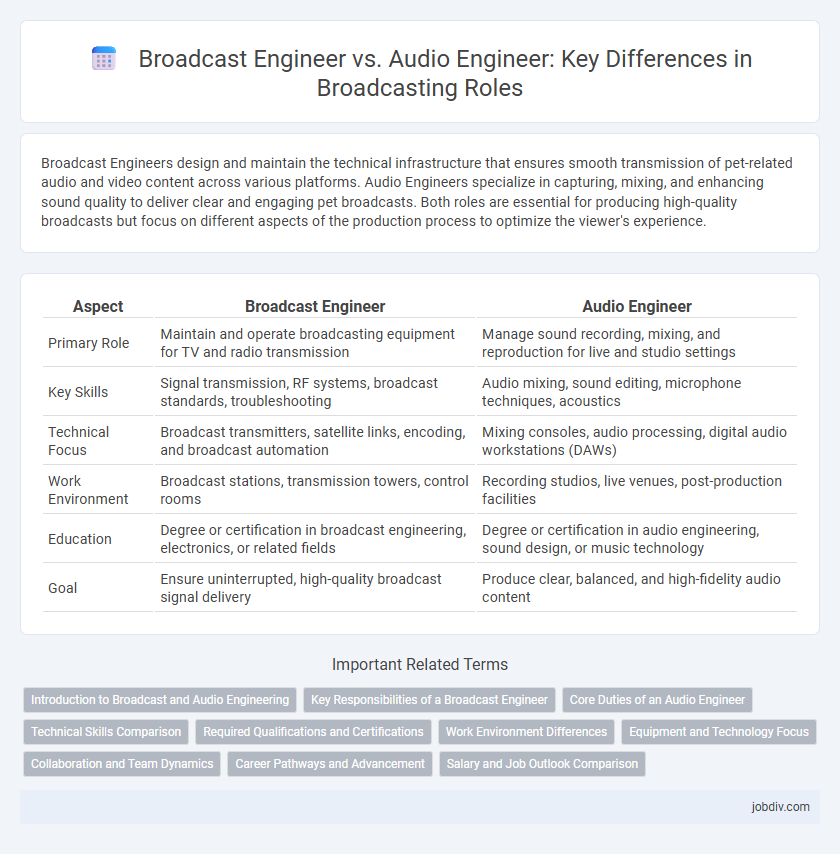Broadcast Engineers design and maintain the technical infrastructure that ensures smooth transmission of pet-related audio and video content across various platforms. Audio Engineers specialize in capturing, mixing, and enhancing sound quality to deliver clear and engaging pet broadcasts. Both roles are essential for producing high-quality broadcasts but focus on different aspects of the production process to optimize the viewer's experience.
Table of Comparison
| Aspect | Broadcast Engineer | Audio Engineer |
|---|---|---|
| Primary Role | Maintain and operate broadcasting equipment for TV and radio transmission | Manage sound recording, mixing, and reproduction for live and studio settings |
| Key Skills | Signal transmission, RF systems, broadcast standards, troubleshooting | Audio mixing, sound editing, microphone techniques, acoustics |
| Technical Focus | Broadcast transmitters, satellite links, encoding, and broadcast automation | Mixing consoles, audio processing, digital audio workstations (DAWs) |
| Work Environment | Broadcast stations, transmission towers, control rooms | Recording studios, live venues, post-production facilities |
| Education | Degree or certification in broadcast engineering, electronics, or related fields | Degree or certification in audio engineering, sound design, or music technology |
| Goal | Ensure uninterrupted, high-quality broadcast signal delivery | Produce clear, balanced, and high-fidelity audio content |
Introduction to Broadcast and Audio Engineering
Broadcast engineers specialize in the technical aspects of transmitting audio and video signals across various platforms, ensuring seamless distribution and compliance with broadcast standards. Audio engineers focus on recording, mixing, and enhancing sound quality in live or studio environments, emphasizing acoustics and sound fidelity. Both roles require a deep understanding of signal processing, equipment operation, and industry protocols to deliver high-quality broadcast content.
Key Responsibilities of a Broadcast Engineer
Broadcast engineers oversee the technical operations of transmission equipment, ensuring seamless signal quality and regulatory compliance during live broadcasts. They manage transmitter maintenance, satellite systems, and network infrastructure to guarantee uninterrupted content delivery. Their expertise extends to troubleshooting hardware failures and optimizing broadcast signals for a wide range of platforms, differentiating them from audio engineers who primarily focus on sound recording and mixing.
Core Duties of an Audio Engineer
Audio engineers specialize in managing sound quality by recording, mixing, and reproducing audio during live broadcasts and studio productions, ensuring clarity and balance. They operate and maintain audio equipment, troubleshoot technical issues, and collaborate closely with producers and talent to achieve the desired auditory experience. Unlike broadcast engineers who focus on signal transmission and broadcast infrastructure, audio engineers concentrate on optimizing sound performance and acoustics.
Technical Skills Comparison
Broadcast engineers specialize in maintaining and troubleshooting transmission equipment, ensuring signal quality across satellite, microwave, and IP-based broadcast systems. Audio engineers focus on sound design, mixing, and acoustics, utilizing digital audio workstations, signal processors, and microphones for optimal audio fidelity. Both roles require proficiency in technical tools, but broadcast engineers emphasize RF technology and network protocols, whereas audio engineers prioritize audio signal flow and studio acoustics.
Required Qualifications and Certifications
Broadcast engineers typically require a bachelor's degree in broadcast engineering, electronics, or a related field, along with certifications such as the Society of Broadcast Engineers (SBE) Certified Broadcast Engineer (CBE) credential. Audio engineers often hold degrees or diplomas in audio engineering, music production, or sound technology, and benefit from certifications like the Audio Engineering Society (AES) membership or Pro Tools Certification. Both roles demand strong technical skills, but broadcast engineers emphasize knowledge in transmission systems and FCC regulations, while audio engineers focus on sound mixing and acoustics expertise.
Work Environment Differences
Broadcast engineers typically work in television or radio stations, managing transmission equipment and ensuring signal quality, often in control rooms or technical booths with stringent regulatory environments. Audio engineers operate in recording studios, live concert venues, or film sets, focusing on sound mixing, equalization, and acoustics in acoustically treated spaces tailored for optimal audio capture and production. The broadcast engineer's work environment prioritizes signal integrity and broadcast continuity, whereas the audio engineer's space emphasizes creative sound design and audio fidelity.
Equipment and Technology Focus
Broadcast engineers specialize in maintaining and optimizing transmission equipment such as transmitters, satellite systems, and broadcast automation software to ensure seamless signal delivery. Audio engineers focus on sound equipment including mixing consoles, microphones, digital audio workstations (DAWs), and signal processors to achieve superior audio quality. Both roles require expertise in evolving technologies, but broadcast engineers prioritize signal integrity across networks, while audio engineers concentrate on acoustic fidelity and sound design.
Collaboration and Team Dynamics
Broadcast engineers and audio engineers collaborate closely to ensure seamless production quality, each bringing specialized expertise in signal flow and sound design respectively. Effective team dynamics depend on clear communication and synchronized workflows to troubleshoot technical issues and optimize audio output during live broadcasts. Their partnership enhances broadcast reliability and delivers an immersive auditory experience for audiences.
Career Pathways and Advancement
Broadcast engineers specialize in maintaining and operating transmission equipment to ensure seamless TV and radio signals, often advancing to roles like chief broadcast engineer or technical director. Audio engineers focus on sound recording, mixing, and mastering in studios or live settings, with career progression leading to positions such as senior audio engineer or sound director. Both career pathways require continuous technical skill development and adaptation to evolving digital technologies in broadcasting environments.
Salary and Job Outlook Comparison
Broadcast engineers typically earn a median salary of around $55,000 to $70,000 annually, reflecting their expertise in managing transmission equipment and signal flow. Audio engineers, specializing in sound recording and mixing, have a salary range of approximately $45,000 to $65,000, with opportunities in music production and live events influencing pay scales. Job outlook for broadcast engineers is projected to decline slightly due to automation, whereas audio engineers may experience moderate growth driven by expanding media platforms and content creation demands.
Broadcast Engineer vs Audio Engineer Infographic

 jobdiv.com
jobdiv.com